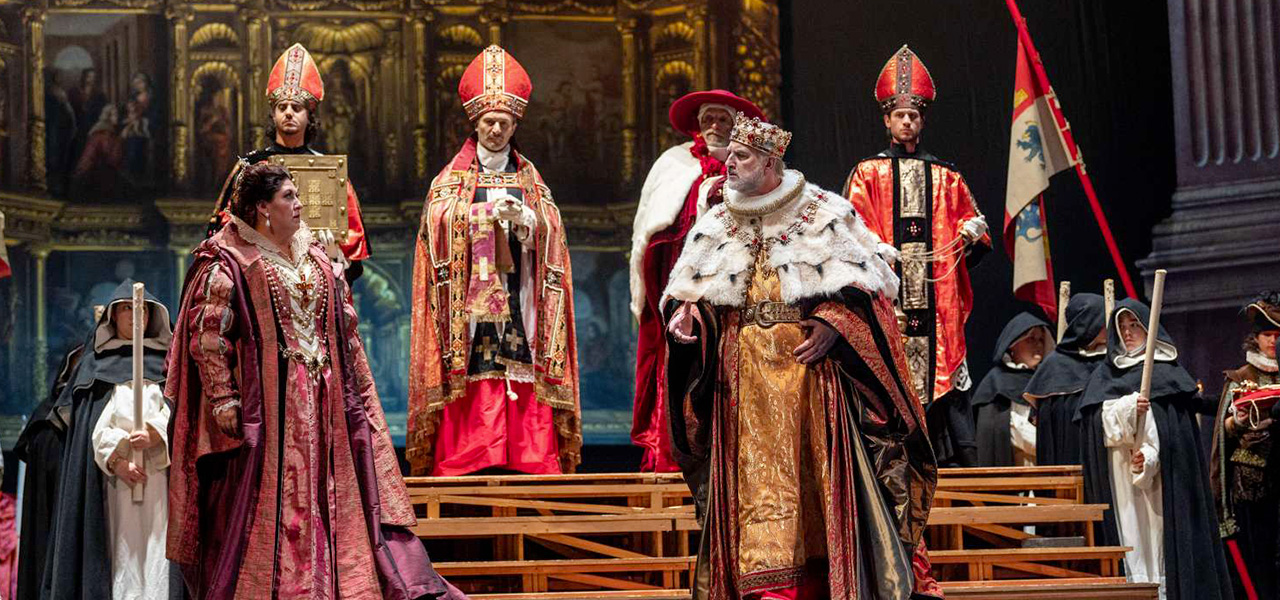Il “Don Carlo,” Giuseppe Verdi’s grandiose and monumental opera, written for the Paris Opera (in French, to a libretto by Joseph Méry and Camille du Locle, so the title was also different “Don Carlos“). It was premiered on March 11, 1867: it was a monumental opera, in five acts and with ballets, as the French tradition wanted. Then it was reworked several times by Verdi, who brought it to Italy in a “leaner” version. Thus wrote Verdi: “Don Carlos is now reduced to four acts, it will be more comfortable, and I think even better, artistically speaking. More concision and more backbone.”
In this opera Verdi refines the psychological research begun with the works of the “popular trilogy.” There are basically three key themes: the contrast of parent and son, which is revealed through the harsh clash between Philip II of Spain, the father, and Don Carlo, on an intimate and political level; the contrast between two different political conceptions, summarized by the confrontation between the Marquis of Posa, inclined to a liberal policy based on autonomies, and Philip II the embodiment of absolute monarchy; and the conflict between State and Church, represented by Philip II’s losing struggle at the start, which will not succeed in imposing himself on the temporal power of the Church, with the Grand Inquisitor.
In reading the libretto and listening to the opera again, I reflected on one aspect in particular. What is highlighted within the plot is that personal contrasts meet conflicts of a historical, political, social nature, the contrast between public duty and individual freedom, and what we call the right to seek and achieve one’s own happiness.
Philip II is presented as a negative personality, who nevertheless reveals an intimately pathetic side in the third act. He is basically a lonely ruler because he is not loved and reciprocated by Elizabeth II. His life is completely bent to the power of the church: the deprivation of his happiness is manifested in the severity and intransigence that are outlined in the character within the story.
Among Verdi’s lovers, Don Carlo is the one with the most romantically impulsive character, bordering on hysteria. His quest for happiness is represented by the possibility of loving Elisabetta, who is destined, however, to become his stepmother. They tell each other that they love each other, but they are also aware that theirs is an unrealizable love in the context of the Spanish court in which they find themselves. Elisabeth is therefore a female figure resigned to unhappiness. She is powerless, loves Don Carlos but decides to re-manifest herself beside Philip II in a kind of bitter resignation about her fate.
The figures of Rodrigo, Marquis of Posa, and Princess Eboli form the driving force of the story and are the only two characters who attempt to rebel against a system that deprives everyone’s freedom and happiness.
Looming over them all is the mighty figure of the Grand Inquisitor, arbiter of everyone’s destinies, to whose will Philip II himself must bow. We could say that this character represents precisely the concept of anti freedom, anti control, anti happiness.
Now, all this is a story but we must remember that it itself is taken from a historical event that really happened. Although centuries have passed since Spanish rule, the Inquisition, etc., we must say that man’s feelings and passions have remained unchanged: those of being in constant pursuit of well-being, love, but most of all happiness.


